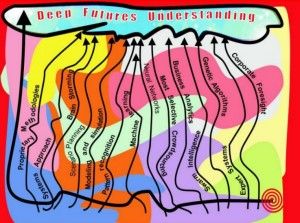Dec 1, 2013
Military–Industrial Complex Supermanagement!
Posted by Andres Agostini in categories: business, complex systems, economics, education, engineering, ethics, existential risks, finance, futurism, information science, science, singularity, sustainability, transparency
EXCERPT
To further underpin this statement, I will share Peter Drucker’s quote, “…The greatest danger in times of turbulence is not the turbulence; it is to act with yesterday’s logic…” And also that of Dr. Stephen Covey, “…Again, yesterday holds tomorrow hostage .… Memory is past. It is finite. Vision is future. It is infinite. Vision is greater than history…” And that of Sir Francis Bacon, “… He that will not apply new remedies must expect new evils, for time is the greatest innovator …”
And that of London Business School Professor Gary Hamel, PhD., “…You cannot get to a new place with an old map…” And that of Alvin Toffler, “…The future always comes too fast and in the wrong order…”
View the entire presentation at http://lnkd.in/dP2PmCP



 The Lifeboat community doesn’t need me to tell them that a growing number of scientists are dedicating their time and energy into research that could radically alter the human aging trajectory. As a result we could be on the verge of the end of aging. But from an anthropological and evolutionary perspective, humans have always had the desire to end aging. Most human culture groups on the planet did this by inventing some belief structure incorporating eternal consciousness. In my mind this is a logical consequence of A) realizing you are going to die and B) not knowing how to prevent that tragedy. So from that perspective, I wanted to create a video that contextualized the modern scientific belief in radical life extension with the religious/mythological beliefs of our ancestors.
The Lifeboat community doesn’t need me to tell them that a growing number of scientists are dedicating their time and energy into research that could radically alter the human aging trajectory. As a result we could be on the verge of the end of aging. But from an anthropological and evolutionary perspective, humans have always had the desire to end aging. Most human culture groups on the planet did this by inventing some belief structure incorporating eternal consciousness. In my mind this is a logical consequence of A) realizing you are going to die and B) not knowing how to prevent that tragedy. So from that perspective, I wanted to create a video that contextualized the modern scientific belief in radical life extension with the religious/mythological beliefs of our ancestors.







